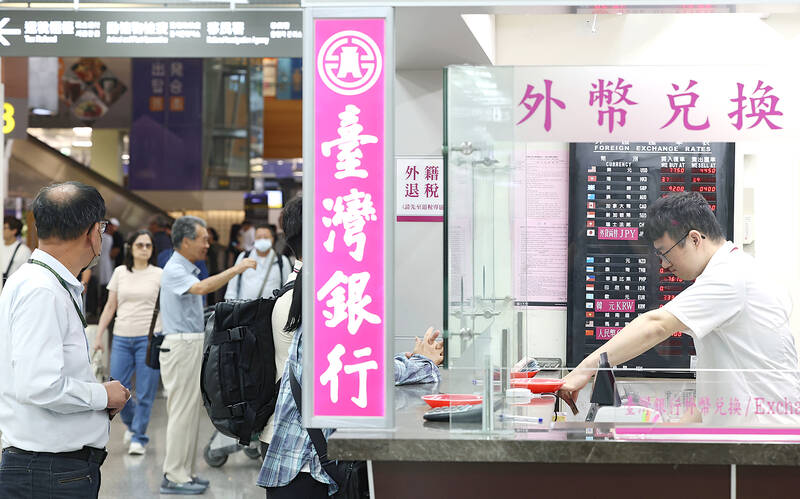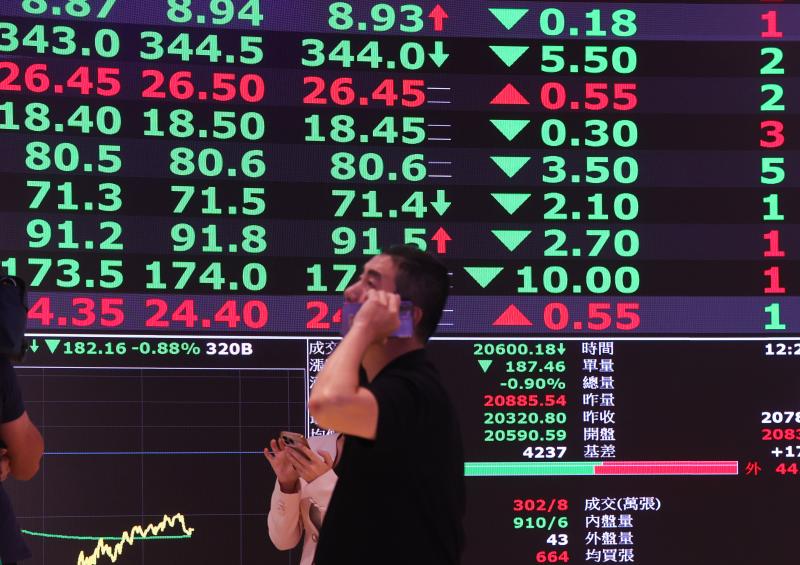The New Taiwan dollar showed signs of stabilizing yesterday after a recent surge, but local shares still closed slightly lower as investors remained concerned over possible US tariffs on semiconductor imports.
The NT dollar reversed its steep rise in the previous two sessions, closing down NT$0.135, or 0.45 percent, at NT$30.280 against the US dollar in Taipei trading.
The NT dollar led volatile moves in Asia earlier this month, surging as much as 5 percent against the US dollar on Monday, its biggest single-day gain since the 1980s.

Photo: CNA
The rally was fueled by exporters rushing to convert US dollar holdings and signs that life insurers might have been hedging their greenback-denominated portfolios.
However, it edged lower yesterday amid a broader pullback in Asian currencies.
Central bank Governor Yang Chin-long (楊金龍) on Monday said that speculative activity had driven the sharp appreciation, prompting the bank to intervene early this month.

Photo: CNA
Yang attributed part of the sharp rise to analyst statements that the NT dollar might rise, calling for them to tamp down their chatter.
President William Lai (賴清德) and the Cabinet’s Office of Trade Negotiations have denied that the currency has been discussed during talks with the US, which has threatened to impose a 32 percent tariff on Taiwanese exports.
While the local currency stabilized after its sharp rally earlier this week, the TAIEX closed down 10.40 points, or 0.05 percent, at 20,522.59 yesterday, as concerns over potential US semiconductor tariffs weighed on sentiment.
After opening down 179.11 points, the market rebounded and reached its intraday high just before noon. However, selling pressure intensified later in the session, particularly in large-cap semiconductor stocks, dragging the TAIEX into negative territory by the close.
“Investors seemed relieved to some extent after the central bank, the largest player in Taiwan’s currency market, said volatility was over,” Mega International Investment Services Corp (兆豐國際投顧) analyst Alex Huang (黃國偉) said.
However, “possible tariffs on semiconductors returned to hurt sentiment. So Taiwan Semiconductor Manufacturing Co [TSMC, 台積電] came under pressure, dragging the broader market lower,” he said.
TSMC, the world’s largest contract chipmaker and also the most heavily weighted stock on the local main board, lost 1.92 percent.
However, easing concerns over the impact of currency fluctuations on insurers’ overseas assets lent support to the financial sector.
Cathay Financial Holding Co (國泰金控) rose 2.19 percent, while E.Sun Financial Holding Co (玉山金控) gained 2.69 percent. In contrast, Fubon Financial Holding Co (富邦金控) slipped 1.25 percent.
With the NT dollar’s unprecedented two-day rally subsiding, investor attention is now turning to the US Federal Reserve’s policy meeting today.
While the Fed is widely expected to keep rates unchanged, the meeting might be the last with such a clear-cut outcome.

In Italy’s storied gold-making hubs, jewelers are reworking their designs to trim gold content as they race to blunt the effect of record prices and appeal to shoppers watching their budgets. Gold prices hit a record high on Thursday, surging near US$5,600 an ounce, more than double a year ago as geopolitical concerns and jitters over trade pushed investors toward the safe-haven asset. The rally is putting undue pressure on small artisans as they face mounting demands from customers, including international brands, to produce cheaper items, from signature pieces to wedding rings, according to interviews with four independent jewelers in Italy’s main

Japanese Prime Minister Sanae Takaichi has talked up the benefits of a weaker yen in a campaign speech, adopting a tone at odds with her finance ministry, which has refused to rule out any options to counter excessive foreign exchange volatility. Takaichi later softened her stance, saying she did not have a preference for the yen’s direction. “People say the weak yen is bad right now, but for export industries, it’s a major opportunity,” Takaichi said on Saturday at a rally for Liberal Democratic Party candidate Daishiro Yamagiwa in Kanagawa Prefecture ahead of a snap election on Sunday. “Whether it’s selling food or

CONCERNS: Tech companies investing in AI businesses that purchase their products have raised questions among investors that they are artificially propping up demand Nvidia Corp chief executive officer Jensen Huang (黃仁勳) on Saturday said that the company would be participating in OpenAI’s latest funding round, describing it as potentially “the largest investment we’ve ever made.” “We will invest a great deal of money,” Huang told reporters while visiting Taipei. “I believe in OpenAI. The work that they do is incredible. They’re one of the most consequential companies of our time.” Huang did not say exactly how much Nvidia might contribute, but described the investment as “huge.” “Let Sam announce how much he’s going to raise — it’s for him to decide,” Huang said, referring to OpenAI

The global server market is expected to grow 12.8 percent annually this year, with artificial intelligence (AI) servers projected to account for 16.5 percent, driven by continued investment in AI infrastructure by major cloud service providers (CSPs), market researcher TrendForce Corp (集邦科技) said yesterday. Global AI server shipments this year are expected to increase 28 percent year-on-year to more than 2.7 million units, driven by sustained demand from CSPs and government sovereign cloud projects, TrendForce analyst Frank Kung (龔明德) told the Taipei Times. Demand for GPU-based AI servers, including Nvidia Corp’s GB and Vera Rubin rack systems, is expected to remain high,